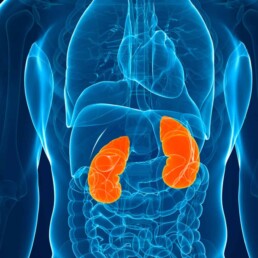Within the body’s intricate symphony, every hormone has a role. FGF-23, or Fibroblast Growth Factor-23, is one such player. Though essential in phosphate regulation, elevated levels of FGF-23 in chronic kidney disease (CKD) have come under scrutiny. Let’s explore this multifaceted molecule and understand why it becomes problematic in CKD.
By Majd Isreb, MD, FACP, FASN, IFMCP
Understanding FGF-23’s Normal Function
FGF-23 is a hormone primarily produced in the bone that helps regulate phosphate and vitamin D metabolism. It maintains phosphate balance, which is essential for building strong bones, cellular function, and energy production. FGF-23 ensures that any excess phosphate gets excreted by the kidneys, thereby preventing a dangerous buildup. But the function of FGF-23 goes beyond merely regulating phosphate.
The Connection Between FGF-23 and Vitamin D
Vitamin D plays a significant role in absorbing phosphate from the diet. Its active form, 1,25-dihydroxy vitamin D, is crucial for this process. FGF-23 decreases the production of this active vitamin D form, thereby limiting phosphate absorption when needed. In turn, vitamin D can regulate FGF-23 production. This interaction ensures that both phosphate levels and FGF-23 activity are tightly controlled.
The Link Between Phosphate Intake and FGF-23
In today’s world, with shifting dietary patterns and increased phosphate intake, especially through processed foods, an overload of this mineral is not uncommon. Even in the early stages of CKD, increased phosphate can push up FGF-23 levels. Managing dietary phosphate is, therefore, a critical part of controlling FGF-23 levels and slowing the progression of CKD.
Challenges in Chronic Kidney Disease (CKD)
In CKD, the kidney’s ability to filter phosphate decreases, leading to an increased production of FGF-23. While this response initially helps to maintain phosphate balance, chronically elevated FGF-23 levels become problematic. High FGF-23 levels are associated with further progression of CKD and adverse cardiovascular outcomes.
In addition, the kidneys’ reduced ability to convert vitamin D into its active form in CKD means that the FGF-23 and vitamin D regulatory cycle becomes disrupted. This can lead to a dangerous imbalance, making managing the disease even more complex.
Join us to end the kidney disease epidemic and receive the FREE Report “5 Pitfalls to Avoid When Caring for Kidney Patients”
The Klotho Connection: A Key Piece of the Puzzle
Klotho, a protein closely tied to FGF-23, is often called the “anti-aging” protein. In healthy kidneys, klotho assists FGF-23 in its function. However, in CKD, klotho levels decrease, diminishing FGF-23’s beneficial effects. This decline, coupled with elevated FGF23, leads to further kidney deterioration and complicates the management of CKD.
FGF-23 in CKD: The Problem with Elevation
While FGF-23’s primary role is maintaining phosphate balance, its chronic elevation in CKD is concerning. The kidneys’ reduced ability to filter excess phosphate leads to a compensatory rise in FGF-23. Unfortunately, this elevation can spell trouble. High levels of FGF-23 are linked to further progression of CKD and adverse cardiovascular outcomes. What starts as a protective measure turns harmful when chronically elevated.
Phosphate in the Diet: An Overlooked Factor
Increased phosphate intake, often hidden in processed foods, significantly contributes to rising FGF-23 levels. Managing dietary phosphate is vital to controlling FGF-23 levels and slowing down the progression of CKD. Awareness about food sources of phosphate and encouraging phosphate-restricted diets can make a substantial difference in managing CKD.
Navigating the FGF-23-Klotho Axis in CKD
Understanding the dynamics between FGF-23, klotho, and CKD provides insights for better management and treatment options. Innovative therapies targeting the FGF-23-klotho axis are under investigation. Interventions that control FGF-23 elevations or replenish klotho may offer improved outcomes and quality of life for CKD patients.
The Importance of Early Intervention
Identifying and addressing elevated FGF-23 levels in the early stages of CKD might be pivotal in preventing further kidney deterioration. Routine monitoring and early intervention, focusing on dietary management and possible therapeutic options, can significantly impact the course of the disease. Therefore, early restriction of dietary phosphate intake is paramount.
The Bottom Line
The relationship between FGF-23, klotho, and CKD is complex and multifaceted. FGF-23’s essential function of maintaining phosphate balance can turn detrimental with chronic elevation, especially when coupled with diminishing klotho. Recognizing these interactions and emphasizing dietary management may be key to improved outcomes for CKD patients. Understanding this delicate balance opens doors to innovative therapeutic strategies that may redefine how we approach kidney health. The continuous exploration of FGF-23’s role holds promise for future advancements in CKD treatment and prevention.






